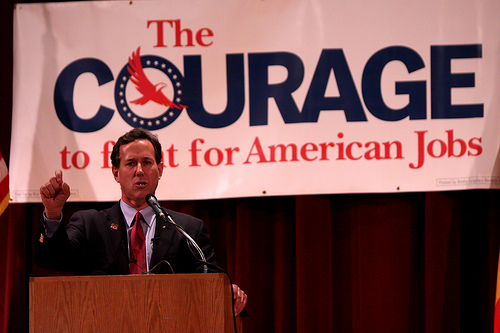


Rick Santorum told the RNC convention the GOP is the party that will defend the rights of individuals with disabilities to live the American dream. Do his policy positions support this?
When Rick Santorum came to the part of his Republican National Convention speech that mentioned “the disabled,” television cameras had already identified a section of the Tampa Bay Times Forum where several people in wheelchairs sat watching and cut to a floor view that silhouetted their figures in front of the brightly lit arena backdrop. But if these individuals had been expecting the aspiring presidential candidate to continue the thread of the preceding sentence about “looking for the dignity of a good job” in a way that would include them, they would be disappointed.
Instead, this was the point in Santorum’s Walt Whitman-esque list of hands pivoted from images of hard work, capability, and determination to one of compassion and mercy. Rather than the hands he had alternately held, shook, grasped, gripped, clasped, and, once again, held, as he and his family traveled the campaign trail this summer, these were hands that required a gentler embrace:
And finally, I cradled the little, broken hands of the disabled. Hands that struggle and bring pain, hands that ennoble us and bring great joy.
Santorum went on to say that those he met from the disability community were drawn to his own personal story. Four and a half years ago, his daughter Bella was born with disabilities that threatened her life. He posits that her survival, despite that early diagnosis, and her continued vitality, is a testament to the GOP’s pro-life platform, which says “each of us has dignity and all of us has the right to live the American Dream.”
As I mentioned Tuesday, it was one of the more emotionally moving moments of the entire convention, perhaps only surpassed by Mitt Romney’s story about his father’s daily habit of leaving a single rose on his mother’s bedside table. A couple weeks before the convention, The Boston Pilot published the article “Loving those with disabilities” by Father Tadeusz Pacholczyk, Ph.D, in which Santorum and his wife Karen share their struggle to find medical providers that were dedicated to providing care for their daughter. Father Pacholczyk, who is doctor of neuroscience, closes the article with a passionate plea, which reads in part:
Discrimination against those with disabilities should never be allowed to gain a foothold in the medical profession, nor be allowed to guide public policy. The true measure of the greatness of a society will always be in terms of how it treats its weakest members, and the authenticity of our own love will be measured by our compassion and acceptance of the disabled and the powerless.
Anyone is welcome to take issue with language by both Santorum and Father Pacholczyk that continually characterizes people with disabilities as broken and powerless; suffice to say it runs counter to the prevailing evidence that, when given the opportunity, people with disabilities are very capable of being productive employees and valuable members of a community, they can even serve as elected officials.
But the question many advocates for people with disabilities would like to ask the former Senator from Pennsylvania would have to do with the impact of his policy positions on those individuals with the same disabilities as Bella, but who were not fortunate enough to be born to parents who enjoy taxpayer-supported health insurance; or whose family lineage did not include grandparents who, as a clinical psychologist and administrative nurse, had the financial wherewithal to give their children access to the American Dream without the support of social programs.
Blogger Ben Adler’s wrap-up of Tuesday night’s convention coverage for The Nation calls Santorum’s opposition to the Affordable Care Act “ironic” in light of his daughter’s experience. Adler also linked to his November 2011 story about Santorum on the campaign trail, in which he points to how the Republican presidential candidate took stances that could potentially impede career training and employment opportunities for people like Bella when they reach adulthood.
Yesterday’s analysis of Jeb Bush’s remarks about the strides Florida has made in educating people with disabilities included a look at the state’s rankings in The Case For Inclusion 2012 study by United Cerebral Palsy (UCP). The goal was to see whether the approach practiced by the state for the last 13 years translated into job opportunities and independent living situations for these people.
With respect to the Commonwealth of Pennsylvania — which Santorum has served as a U.S. Representative for four years and a U.S. Senator for 12 more — its number 10 overall ranking in the UCP survey is largely a result of its dedication to providing supported and competitive employment opportunities for individuals with disabilities. Pennsylvania serves the seventh highest percentage of people in these programs, including the fourth highest total of people using vocational rehab services in the nation.
Not surprisingly, Pennsylvania’s success correlates with spending the seventh most on these types of programs (just behind Massachusetts). If the fiscally conservative Santorum were to enact all the cuts to government spending he says he would like to see, how would he provide the “right to live the American Dream”and make life matter for those individuals who are like his daughter in ability but not in bloodline? Share your thoughts or any links you might have in the comments section.
Image by Gage Skidmore.